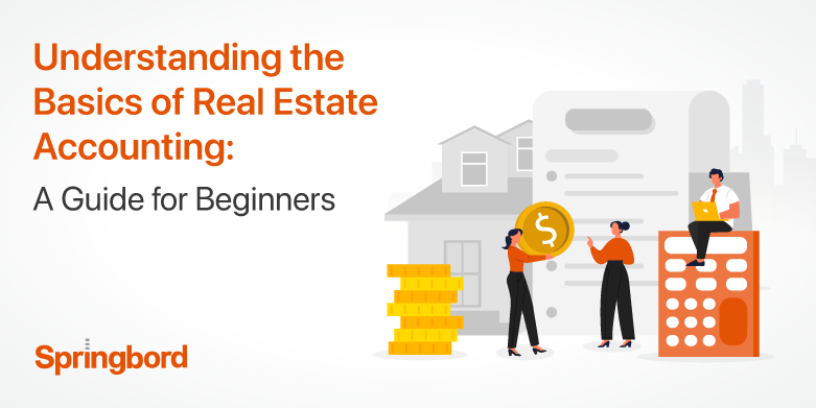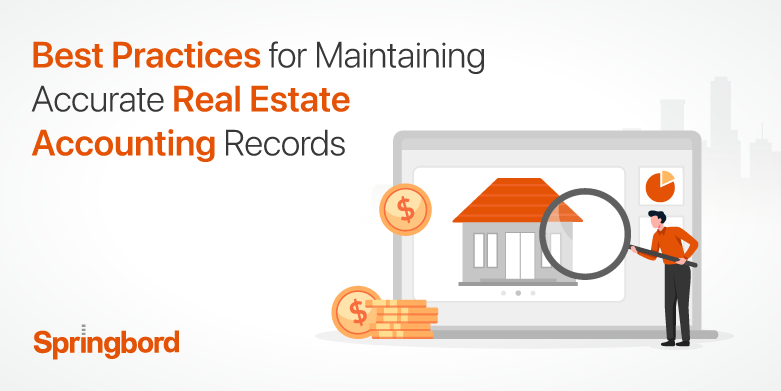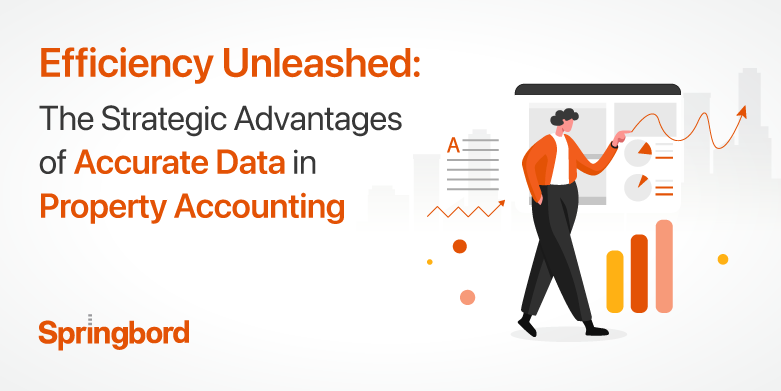 Read time 6 min
Read time 6 minThe Significance of Real Estate Accounting in Business Success
Real estate accounting is a specialized area of accounting that focuses on recording, analyzing, and reporting financial transactions related to real estate operations. This field plays a pivotal role in business decision-making and the overall financial health of companies engaged in real estate, from small property management firms to large real estate investment trusts.
Accurate real estate accounting ensures compliance with regulatory standards, helps in strategic planning, and enables effective cash flow management. At Springbord, we recognize the critical importance of empowering business owners with the knowledge and tools necessary for effective financial management. Through our expertise in real estate accounting services, we aim to enhance the financial success and sustainability of businesses in this sector.
Fundamental Concepts of Real Estate Accounting
Accrual vs. Cash Accounting
In real estate transactions, the choice between accrual and cash accounting methods can significantly impact financial reporting and tax obligations. Accrual accounting records transactions when they are earned or incurred, regardless of when cash is exchanged. This method provides a more accurate picture of a company’s financial position but can be more complex to implement.
On the other hand, cash accounting records transactions only when cash is received or paid. This simplicity makes it appealing for smaller businesses, though it may not always reflect the true financial status of a company. Real estate businesses must carefully consider which method aligns best with their operational needs and compliance requirements.
Understanding Financial Statements
Financial statements are the cornerstone of real estate accounting, offering insights into a business’s financial health. The balance sheet provides a snapshot of a company’s assets, liabilities, and equity at a specific point in time.
The income statement, or profit and loss statement, shows the company’s revenues and expenses over a period, highlighting operational profitability. The cash flow statement tracks the inflow and outflow of cash, crucial for managing liquidity in real estate operations.
Tailoring these statements to real estate activities involves recognizing property acquisitions, rental income, operating expenses, and financing costs, offering stakeholders a clear view of financial performance.
Key Real Estate Accounting Practices
Property Management Accounting
Effective property management accounting is essential for tracking tenant leases, maintenance costs, and operational expenses. It involves detailed record-keeping for rental income, security deposits, and costs associated with property upkeep and improvements.
This practice ensures compliance, optimizes property value, and enhances tenant satisfaction, contributing to the long-term success of real estate investments.
Capitalization and Depreciation
Capitalizing property acquisitions and calculating depreciation are critical in real estate accounting. Capitalization involves recognizing the purchase cost of a property as an asset on the balance sheet, spreading the expense over its useful life.
Depreciation accounts for the reduction in value of buildings and improvements over time, offering tax advantages and affecting net income calculations. These practices require careful consideration of tax regulations and accounting standards to ensure accuracy and compliance.
Revenue Recognition in Real Estate
Lease Accounting Standards
Recent updates to lease accounting standards, notably IFRS 16 and ASC 842, have significantly altered the landscape for real estate businesses. These standards require lessees to recognize nearly all leases on their balance sheets, affecting how companies report their financial position and performance.
For real estate businesses, this means a more transparent portrayal of their leasing activities, with both assets and liabilities associated with leases being recognized. The implementation of these standards requires a detailed understanding of lease terms and their financial implications, emphasizing the need for expert accounting practices to ensure compliance and optimize financial reporting.
Handling Sale and Purchase Transactions
Recognizing revenue from property sales in real estate accounting demands careful consideration of the timing and amount of revenue to be recognized. The installment sale method allows revenue recognition over time as payments are received, beneficial for managing cash flow and tax obligations.
Conversely, the cost recovery method delays revenue recognition until all costs of the sold property have been recovered, minimizing tax liabilities but potentially impacting reported earnings. Real estate businesses must navigate these methods judiciously, balancing financial reporting accuracy with strategic financial planning.
Expense Management and Optimization
Cost Segregation Studies
Cost segregation is a strategic tax planning tool that allows real estate businesses to accelerate depreciation deductions, thereby reducing taxes and boosting cash flow. By identifying and reclassifying personal property assets to shorten the depreciation time, cost segregation studies can significantly impact a property’s initial and future tax obligations.
Implementing these studies requires deep knowledge of tax laws and regulations, highlighting the value of specialized accounting expertise in maximizing the financial benefits of real estate investments.
Operating Expenses vs. Capital Expenditures
Understanding the distinction between operating expenses and capital expenditures is crucial for effective financial management in real estate. Operating expenses include costs necessary for the day-to-day maintenance and management of a property, such as utilities, property taxes, and routine repairs.
These expenses are fully deductible in the year they are incurred. Capital expenditures, however, are investments in the property that add value or extend its life, such as major renovations or the addition of new facilities. These costs are capitalized and depreciated over their useful life, requiring strategic planning for budgeting and tax purposes.
Tax Considerations and Strategy
Real Estate Specific Tax Issues
Real estate businesses face unique tax considerations, including property taxes, 1031 exchanges, and other sector-specific issues. Understanding these elements is essential for minimizing tax liabilities while complying with regulations.
For instance, 1031 exchanges allow for the deferral of capital gains taxes on the sale of a property when it is exchanged for a like-kind property, offering significant tax advantages under certain conditions. Navigating these and other tax issues demands specialized knowledge and strategic planning.
Strategic Tax Planning
Strategic tax planning is paramount for real estate businesses aiming to minimize tax liability and enhance profitability. This involves a comprehensive approach, from selecting the appropriate business structure to optimizing deductions and leveraging tax credits.
Effective tax planning requires staying abreast of current tax laws and regulations, as well as understanding the intricate details of real estate transactions and accounting practices.
Implementing Technology in Real Estate Accounting
Software Solutions for Real Estate Accounting
In today’s rapidly evolving real estate market, leveraging the right accounting software is pivotal. The best accounting software for real estate needs offers comprehensive solutions for property management, lease accounting, budgeting, and financial reporting.
Solutions such as QuickBooks, Xero, and specialized real estate platforms like AppFolio and Yardi are tailored to accommodate the intricacies of real estate transactions and property management. These software packages streamline operations, automate routine tasks, and ensure compliance with industry standards, significantly enhancing efficiency and accuracy in financial management.
The Role of Data Analytics
Data analytics has transformed how real estate businesses approach financial reporting and decision-making. By harnessing the power of data analytics, companies can unlock valuable insights into market trends, investment performance, and operational efficiency.
This data-driven approach enables real estate professionals to make informed decisions, optimize portfolio performance, and identify new opportunities for growth. Implementing data analytics can lead to more strategic financial planning and a competitive edge in the real estate market.
Springbord’s Expertise in Real Estate Accounting
Custom Solutions for Real Estate Businesses
Springbord stands at the forefront of providing custom accounting solutions tailored to the unique needs of the real estate sector. Recognizing the complexity and dynamic nature of real estate transactions, Springbord offers services that encompass lease accounting, revenue recognition, tax strategy, and financial reporting.
Our team of experts is equipped with the latest technology and deep industry knowledge, ensuring that our clients receive the most efficient, accurate, and compliant accounting support. Springbord’s commitment to innovation and excellence positions us as a leader in real estate accounting solutions.
Conclusion: Navigating Real Estate Accounting with Springbord
Mastering the basics of real estate accounting is essential for the success of any real estate business. Accurate and efficient accounting practices are the foundation of sound financial decision-making and the key to achieving long-term business goals. The complexities of real estate transactions, including lease accounting, revenue recognition, and tax planning, require specialized knowledge and expertise.
Springbord is dedicated to empowering real estate businesses with the knowledge, tools, and technology to navigate these challenges effectively. Our custom accounting solutions are designed to meet the specific needs of the real estate sector, helping businesses streamline their accounting processes, enhance financial clarity, and improve profitability. By partnering with Springbord, real estate professionals can leverage our expertise and innovative technology solutions to optimize their accounting practices and drive business success.
We encourage real estate businesses to explore how Springbord’s expertise and tailored solutions can transform their accounting practices, ensuring accuracy, compliance, and strategic financial management. Reach out us to guide you through the complexities of real estate accounting, helping you to achieve your financial goals and maximize your business potential.







